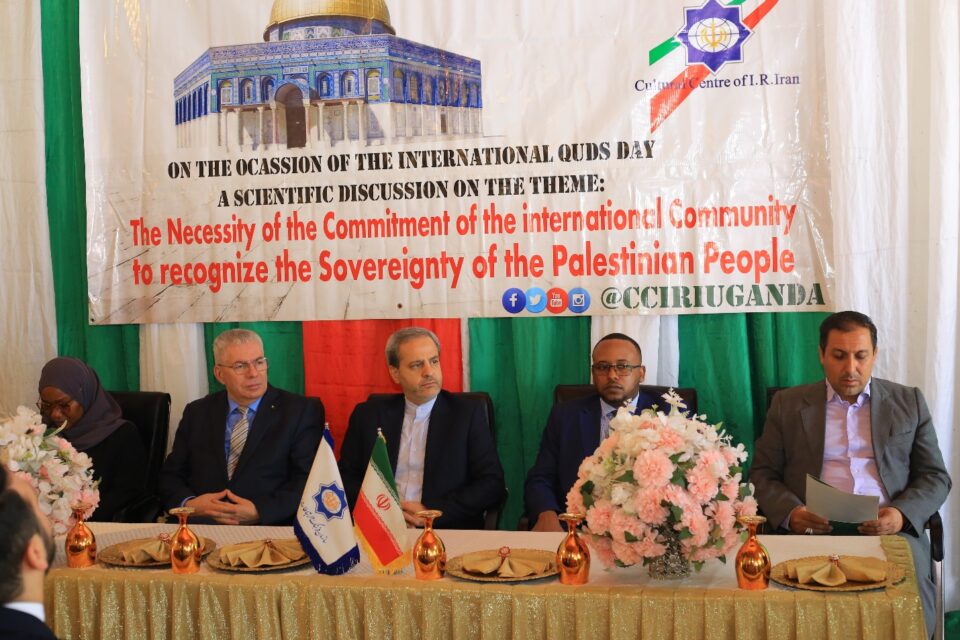By Frank Kamuntu
International Quds Day was marked at Kampala University, Ggaba, in an event organized by the Cultural Consulate of the Embassy of the Islamic Republic of Iran in cooperation with the university’s management.
The event attracted high-level dignitaries, including Dr. Waldah M. Rajab Gyagenda, Deputy Vice Chancellor of Kampala University; Owek. Amb. Alhaj. Prof. Emeritus Dr. Litt Badru Dungu Kateregga, Vice Chancellor of Kampala University; H.E. Evgeny Revyakin, Minister-Counsellor of the Russian Embassy in Uganda; Mr. Abdollah Abbasi, the Iranian Cultural Counsellor; H.E. Majid Saffar, Ambassador of the Islamic Republic of Iran; H.E. Amokrane Mourad, Algerian Ambassador to Uganda; the Deputy Ambassador of the Republic of Sudan; Dr. Rouhollah Dehghani, Principal of Al-Mustafa Islamic College Kyengera; Mr. Chamani Abolfazl, an Iranian Quran reciter from Mashhad, Iran; Dr. Hadi Assadi, lecturer at Al-Mustafa Islamic College Kyengera; Associate Prof. Dr. Nabukeera Madinah Sebyala, Director of the Islamic University in Uganda, Female Campus; Hon. Issah Katungulu Luyimbaazi, African Youth Ambassador; Sheikh Muhammad Ali Mundu, leader of the Twalika Community in East Africa; and media partners, among others.
The event opened with a Quran recitation by Mr. Chamani Abolfazl, filling the audience with a sense of spiritual wellness.
Delivering the welcoming remarks on behalf of Kampala University, Dr. Waldah M. Rajab Gyagenda recognized the invited guests and scholars, expressing gratitude for the university’s relationship with the Embassy of the Islamic Republic of Iran.
She commended Iran’s resilience in championing International Quds Day over the years and criticized the ongoing killings of women and children in Palestine by Israel and its allies, despite international condemnation.

Hon. Issah Katungulu Luyimbaazi gave an overview of International Quds Day, explaining that it is an annual pro-Palestinian event held on the last Friday of Ramadan to express solidarity with the Palestinian people and oppose Israeli occupation.
He noted that Jerusalem is sacred to Christianity, Islam, and Judaism, and that the event traces back to 1979, when Iran’s Supreme Leader, Imam Khomeini, established it to reject Israel’s occupation of East Jerusalem.
He further highlighted that Quds Day has become a symbol of global resistance, with free thinkers around the world condemning the United States and Western countries for their support of Israel’s military actions in Gaza.

Prof. Adam Sebyala Al-Maliky, an academic professor and president of the Uganda Shia Ithna Ashari Muslim Community, addressed what he called the “intractable problem of Palestine.”
He discussed the historical presence of various communities in the region, arguing that claims of exclusive Jewish ownership of the land are historically flawed. He traced the origins of Jewish settlement in the region, referencing Prophet Ibrahim’s (Abraham’s) journey and the coexistence of different peoples in Palestine.
He criticized the historical and religious justifications used to support Israeli territorial claims and condemned the continued displacement and violence against Palestinians.

He argued that Jewish exclusivity in the region led to forced evictions and massacres, citing biblical and historical accounts of conquest.
Dr. Hadi Assadi from Al-Mustafa Islamic College Kyengera shared reports on Prophet Muhammad’s emphasis on inclusivity and urged Muslims to take social responsibility beyond religious obligations.
He reminded the audience that a true Muslim must be concerned about the well-being of others, emphasizing the duty to support the Palestinian cause.
Dr. Hamza Kyeyune, a media personality, questioned how much suffering must continue before effective action is taken. He pointed to Iran’s resilience following the Islamic Revolution, arguing that unity and reliance on faith enabled the country to withstand external aggression.
Sister Aite Shamlah from Al-Mustafa Islamic College called for an economic boycott of Israeli products to weaken Israel’s financial support and military capabilities.
The Deputy Ambassador of Sudan praised Imam Khomeini’s leadership in declaring Quds Day as a platform for global solidarity with the Palestinian people.
He reiterated Sudan’s historical support for Palestine since the 1950s, while highlighting the internal conflicts Sudan faces due to foreign interference aimed at weakening its support for Palestine. He called upon Muslims to remain steadfast in supporting the Palestinian struggle until full sovereignty and peace are achieved.
Dr. Rouhollah Dehghani, Principal of Al-Mustafa Islamic College Kyengera, emphasized the significance of the struggle of Karbala as a source of inspiration for oppressed nations, including Palestine.
Mr. Abdollah Abbasi, the Iranian Cultural Counsellor, described Quds Day as a time to reflect on the oppression of Palestinians and denounced Western countries for supporting Israel’s military actions.
He condemned attacks on schools, hospitals, and diplomatic missions as violations of international law and urged participants to show solidarity with Palestinians. He praised the “axis of resistance” for standing against Israeli actions.

Associate Prof. Dr. Nabukeera Madinah Sebyala recognized Imam Khomeini’s leadership in declaring Quds Day as an essential event for Muslim unity.
H.E. Majid Saffar, Ambassador of the Islamic Republic of Iran, acknowledged the presence of dignitaries and called upon participants to take active steps in defending Palestinian rights. He emphasized that the issue of Palestine is not limited to Muslims but is a humanitarian concern for all people of faith and conscience.
He urged participants to move beyond verbal condemnation by engaging in boycotts, sanctions, and legal action against Israeli policies.

He stressed the importance of educating future generations about injustices in the Middle East and advocating for peace and sovereignty for the Palestinian people.

